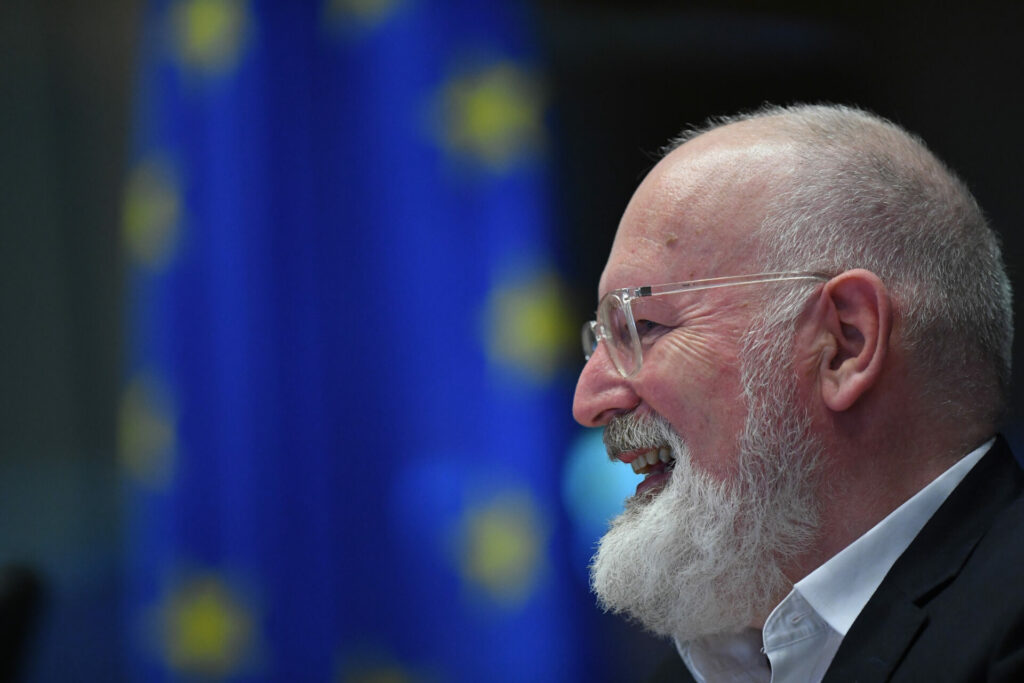The European Union should embrace the fact that English is increasingly being used as a language for non-native speakers from different countries to communicate in, even if it is not grammatically perfect, said Executive Vice-President for the European Green Deal Frans Timmermans.
During a speech delivered at the occasion of the 61st Dies Natalis of the University of Twente in the Netherlands, Timmermans (who is a Dutch national) addressed the increasing complaints about the university's international focus, which some critics say is to the detriment of students' Dutch language skills.
"The problem with our Dutch language is not the fact that in higher education we use English to communicate," he said. "It is that we neglect to educate our children at a very early age on speaking, reading and listening to Dutch very well."
'Not just for the elites'
People who are proficient in their mother tongue from an early age – because they are read to and encouraged to read themselves – can learn another language just "as an extra," Timmermans said. "It will not limit your knowledge of Dutch." On the contrary, it will "only strengthen your knowledge, and especially your love" of your native language.
"So do not let people tell you that speaking English is bad for Dutch," he stressed. "Not having a decent education at an early age is bad for Dutch, not reading to your kids when they are small is bad for Dutch, not having a conversation every time at the dinner table is bad for Dutch. But speaking English at university is not bad for Dutch."
Additionally, there is now a lingua franca (a common language used for communication between groups or people who do not share a native language) that is "not just for the elites," Timmermans underlined. About a century ago, French was often used as lingua franca in Europe – but only by the elites discussing diplomacy and politics, not by "regular" people.
In Belgium, the elite's use of French in the 19th century was even one of the causes of the so-called "language battle," the consequences of which, for example, are still felt today through the country's linguistic divide.
"For the first time in human history, we have a global lingua franca that transcends societal layers," said Timmermans. "Thanks to the internet, thanks to other developments, thanks to the predominance of Anglo-Saxon culture, English is an instrument for all. This is the first time that we have a true Lingua Franca for all: bad English."
The last EU-wide survey of second language proficiency showed that a majority of EU citizens (51%) could speak English, compared to 26% being able to communicate in French. More recent data, however, shows that the vast majority of Member States' citizens speak English: from 55% in France to 71% in Sweden, with an EU average of 65%.
Related News
- 'Can't ignore English': Belgium needs to re-think languages, says Sven Gatz
- Nederlands, AUB: Brussels communes criticised for Francophone bias
- Should English be Europe's common continental language?
As Timmermans said, the fact that English is the most-spoken language in Europe follows global trends and is largely due to US cultural power. When counting both first and second-language speakers, it is also the most widely-spoken language in the world.
As the capital of the EU, the predominantly Francophone Brussels has also been taking steps to accommodate its international residents – many of which affiliated with the EU or NATO institutions – in English in recent years.
Brussels Minister for the Promotion of Multilingualism Sven Gatz, for example, has been pushing to include English in all of Brussels' official communication in addition to French and Dutch.
The municipality of Etterbeek is allowing English to be used in discussions for local issues, while the the municipality of Schaerbeek has started assisting people in English, even carrying out weddings in the language.

